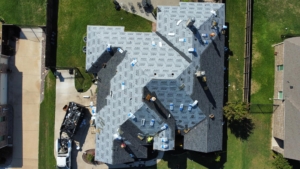Exploring Synthetic Roofing Materials for Your Homes
Synthetic Solutions: Exploring Modern Roofing Materials for Homes
When it comes to choosing roofing materials for your home, durability, and longevity are key factors to consider. Synthetic roofing materials offer an attractive alternative to traditional roofing options. They are designed to mimic the appearance of natural materials while providing enhanced durability, weather resistance, and low maintenance. In this blog post, Davis Roofing Solutions will delve into the world of synthetic roofing materials. We will explore their benefits, discuss popular options, and provide insights into their installation and maintenance. Whether you’re looking for the charm of synthetic slate, the versatility of composite shingles, or the durability of polymer roofing, we’ll guide you through the options to help you make an informed decision for your home.
Benefits of Synthetic Roofing Materials
Synthetic roofing materials offer several benefits that make them a compelling choice for homeowners:
- Durability: Synthetic materials are engineered to withstand harsh weather conditions, including heavy rain, hail, wind, and UV radiation. They are resistant to cracking, warping, and fading, ensuring a longer lifespan compared to traditional materials.
- Cost-Effective: While synthetic roofing materials may have a higher upfront cost, their long-term cost-effectiveness becomes evident due to their durability and low maintenance requirements. They often require fewer repairs and replacements over time.
- Variety of Styles and Colors: Synthetic materials come in a wide range of styles and colors, allowing homeowners to achieve the desired aesthetic for their homes. Whether you prefer the classic look of slate, the rustic appeal of cedar shake, or the sleek appearance of composite shingles, there is a synthetic option available to suit your preferences.
- Lightweight: These materials are generally lightweight, making them easier to handle during installation. This characteristic can reduce the structural strain on your home and may even lead to cost savings in terms of supporting structures.
Popular Types of Synthetic Roofing Materials
There are several popular types of synthetic roofing materials available in the market. Let’s explore a few of them:
- Synthetic Slate: Synthetic slate roofing is designed to resemble natural slate but without the high cost and weight. It offers excellent durability, fire resistance, and a wide range of colors and textures. Synthetic slate is lightweight and easier to install compared to natural slate.
- Composite Shingles: Composite shingles are made from a blend of materials, such as recycled plastics, rubber, and wood fibers. They can mimic the appearance of traditional materials like wood shakes, asphalt shingles, or even slate. Composite shingles provide durability, versatility, and resistance to weather elements.
- Polymer Roofing: Polymer roofing materials are known for their exceptional strength, impact resistance, and longevity. They can imitate the look of various materials, including slate, wood, or clay tiles. Polymer roofs are lightweight, require minimal maintenance, and offer superior weather resistance.
- Engineered Rubber Roofing: Engineered rubber roofing is a synthetic option that offers durability, flexibility, and resistance to extreme temperatures. It can withstand thermal expansion and contraction, making it suitable for regions with fluctuating weather conditions.
Installation and Maintenance Considerations
Proper installation and maintenance are essential to ensure the optimal performance of synthetic roofing materials:
- Professional Installation: It’s crucial to hire an experienced roofing contractor who is familiar with synthetic materials. They can ensure proper installation techniques, including proper underlayment, flashing, and fastening, to maximize the durability and performance of the synthetic roof.
- Regular Inspections: Schedule routine inspections to identify any signs of damage, such as cracked or loose tiles, shingles, or seams. Early detection allows for timely repairs and prevents potential leaks or further damage.
- Follow Manufacturer Guidelines: It come with specific manufacturer guidelines for installation, maintenance, and cleaning. It’s important to follow these instructions to avoid voiding warranties and to ensure the longevity of the roof.
- Gentle Cleaning Methods: These are generally low maintenance, but periodic cleaning may be required to remove debris, moss, or algae. Use gentle cleaning methods recommended by the manufacturer to avoid damaging the surface of the synthetic material.
Environmental Considerations
Synthetic roofing materials offer certain environmental advantages:
- Sustainability: Many synthetic roofing materials are made from recycled materials, reducing the demand for new resources. By choosing synthetic options, you contribute to sustainable practices and the reduction of waste.
- Energy Efficiency: Some synthetic materials, such as reflective polymer roofs, can help improve energy efficiency by reducing heat absorption and lowering cooling costs during hot weather.
- Longevity and Reduced Waste: The durability and long lifespan of synthetic roofing materials contribute to reduced waste over time. They require fewer replacements and repairs, leading to less material waste compared to traditional roofing options.
- Recyclability: Synthetic roofing materials, depending on their composition, may be recyclable at the end of their lifespan. Check with the manufacturer or local recycling facilities to explore recycling options for specific synthetic materials.
Conclusion
Synthetic roofing materials offer homeowners a durable and low-maintenance alternative to traditional roofing options. With their longevity, weather resistance, and aesthetic appeal, synthetic materials can enhance the beauty and protection of your home. Davis Roofing Solutions is here to assist you in exploring and selecting the best synthetic roofing option for your home. Contact us today to discuss your roofing needs and discover the benefits of synthetic materials.





